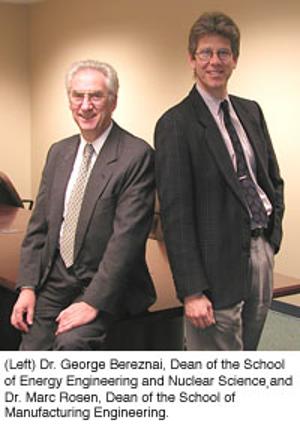Canada's newest university doubles 2003 enrolment of its engineering programs to ease double cohort
New university offers Canada's first stand-alone nuclear engineering program and one of only two Ontario manufacturing engineering programs
December 10, 2002

The Oshawa-based university will offer Canada's first stand-alone nuclear engineering degree program. The Honours Bachelor of Engineering in Nuclear Engineering degree is the most comprehensive program of its kind in Canada. As well, the university's Honours Bachelor of Engineering in Manufacturing Engineering degree will be one of only two stand-alone degree programs of their kind in Ontario.
"With 60 first-year students, the university will offer more spaces in nuclear engineering than all other Canadian universities' engineering programs combined where nuclear energy is a component," according to Dr. George Bereznai, dean of the School of Energy Engineering and Nuclear Science at the University of Ontario Institute of Technology.
"To help meet the needs of students in the double cohort, we have increased enrolment in the manufacturing engineering program for September 2003 to 100 from 50 first-year students," says Marc Rosen, dean of the School of Manufacturing Engineering at the University of Ontario Institute of Technology.
Critical need for nuclear and manufacturing engineers
"There has never been a more exciting time to study and work in nuclear engineering," says Dr. Bereznai. "As the world's population continues to grow, the need to generate electricity increases. Nuclear power is the most cost-effective and environmentally safe way of meeting that need. With over 500 nuclear specialists expected to retire over the next decade in Ontario, we need a new generation of nuclear engineers to design, operate and maintain the most advanced and efficient nuclear reactors. Because of the high demand for these specialized skills, graduates will command much higher than average salaries."
Similarly, growing industrial development in the Greater Toronto Area and across the province is driving a major boost in the number of manufacturing engineers needed over the next decade, according to Dr. Rosen.
Manufacturing in Ontario is a $290-billion industry, employing one million people directly and another one million indirectly. Manufacturing accounts for approximately one quarter of Ontario's economy. With many manufacturing engineers approaching retirement age, graduates are in high demand, says Dr. Rosen.
"When most students think of manufacturing engineering, they think of the automotive sector and they don't realize that the field is really diverse. Manufacturing engineering provides job opportunities in almost every sector from aerospace and biotechnology to telecommunications, and industrial and commercial product manufacturing. Even toys are manufactured."
The use of technology plays an integral role in higher learning at the University of Ontario Institute of Technology. At Ontario's first laptop-based university, students will use the latest model of the IBM ThinkPad and benefit from fully networked classrooms, labs and learning spaces.
About the nuclear engineering program
The university's nuclear engineering program will produce graduates with the expertise to work and manage the work of others in one or more areas of research, development, design, maintenance, operation and decommissioning of nuclear power plants and related facilities. Students will learn about nuclear physics, materials science and risk analysis, as well as the design of nuclear power plants.
Students will use laptop computers in the labs, as well as equipment similar to that found in industry, research and design institutes. In addition to completing assignments and conducting research, students will use laptop computers to simulate the operation of nuclear power plants.
"Our program will offer the most extensive computer simulation of nuclear power plants of any engineering program in Ontario," notes Dr. Bereznai.
About the manufacturing engineering program
The university's manufacturing engineering degree will provide students with engineering creativity and design abilities through applied courses such as computer-aided design, solid mechanics, machines, robotics, mechatronics and quality control, as well as a strong foundation in the fundamentals of mathematics and science. Management courses prepare students for the progression from technical to managerial positions. Students will learn research, analytical, communication and teamwork skills.
State-of-the-art manufacturing and computer labs will provide students with plenty of practical, hands-on experience in fluid mechanics, thermodynamics, robotics, kinematics and mechatronics.
The Bachelor of Engineering in Nuclear Engineering and Bachelor of Engineering in Manufacturing Engineering have been developed to meet the requirements of the Canadian Engineering Accreditation Board. For more information, visit www.uoit.ca,
e-mail admissions@uoit.ca, or call 1.866.844.8648.
About Ontario Tech University
A modern, forward-thinking university, Ontario Tech advances the discovery and application of knowledge to accelerate economic growth, regional development and social innovation. We inspire and equip our students and our graduates to make a positive impact in a tech-focused world. For us, it’s not only about developing the next tech breakthrough. Understanding and integrating the social and ethical implications of technology differentiates us as university. Learn more at ontariotechu.ca.